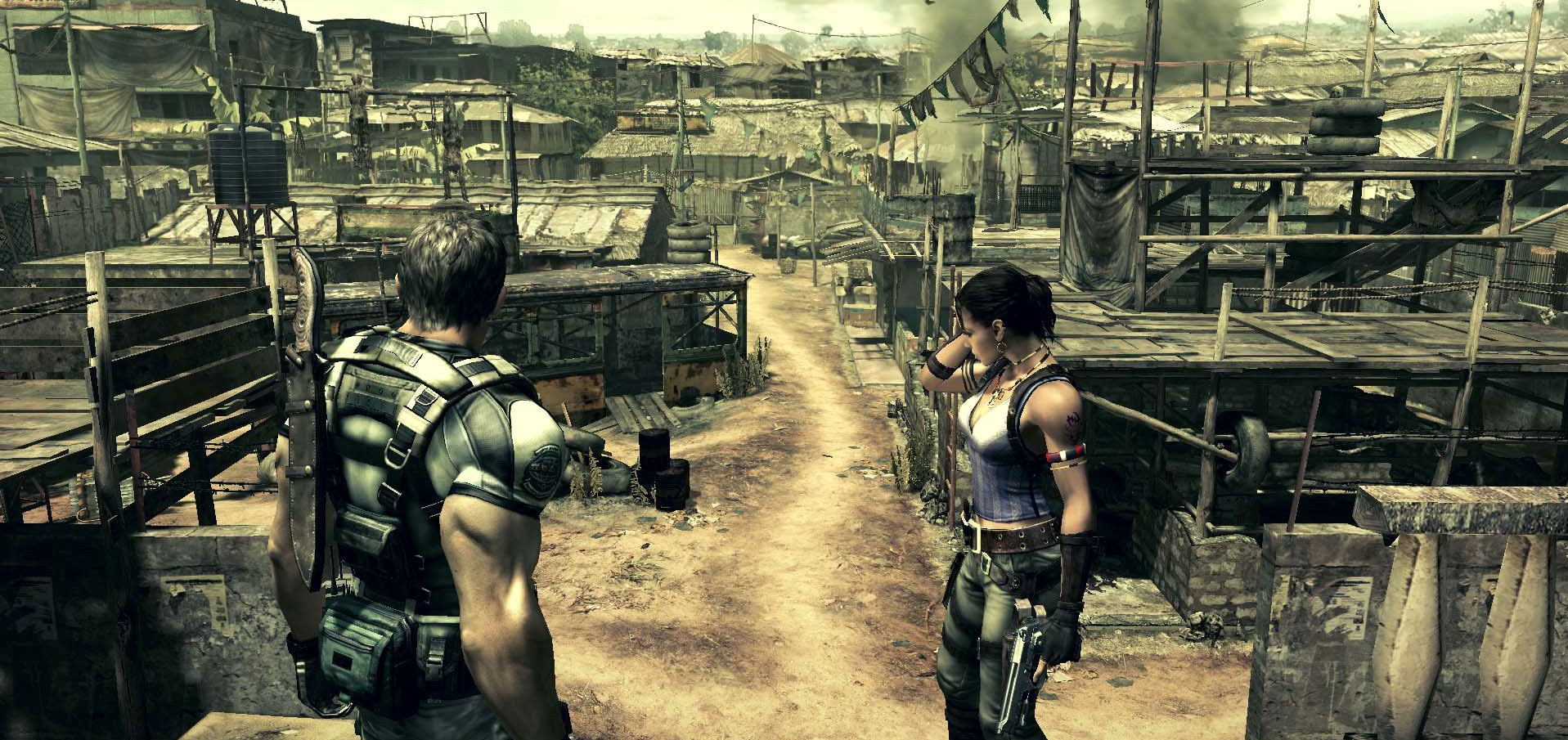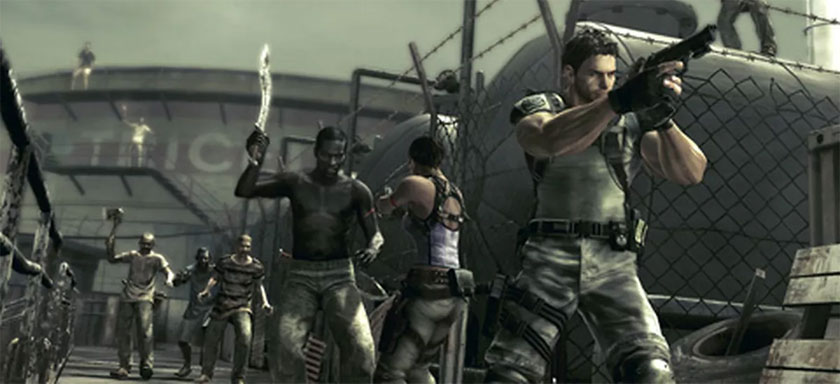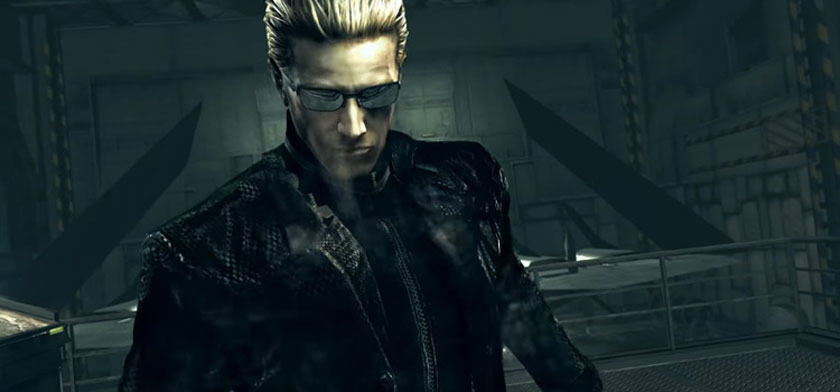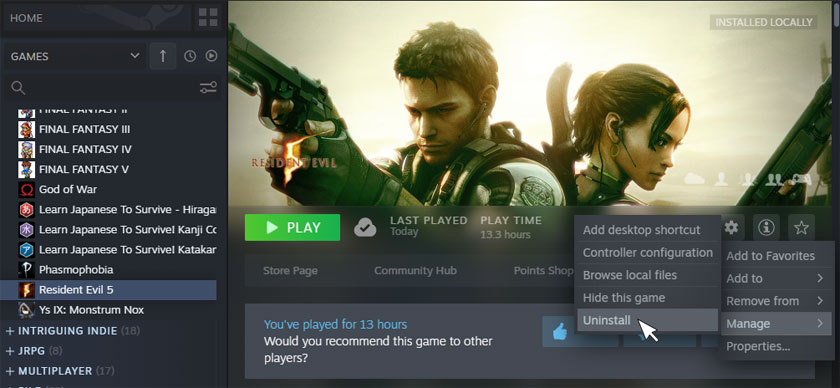Trying to Love Resident Evil 5

When Shamus and I had decided to play Resident Evil 5 on stream, we both had a goal to be as positive about the experience as possible. I, in particular, didn’t want it to just be a “hate play” where we did nothing but criticize the experience. On my part, this is partially due to having played the game enough that I know I enjoy it. It’s not “bad” in the sense that it has little redeeming value beyond a lesson of what not to do.
However, standing in the shadow of Resident Evil 4, it’s easy to find little mistakes or frustrations that drive one’s perception towards a great sense of inferiority. In comparison to its predecessor, Resident Evil 5 is bad. Compared to other games, however, is it really as bad as the game’s reputation suggests?
Well… yes, but, no. The Gears of War trilogy managed to provide a consistently good experience across all three games around the same time period. Imperfect, as all things are, and with their own number of frustrations, but ultimately Gears of War “feels better” to play simply due to a more consistent experience (and we don’t talk about Gears of War 4... erm, beyond that time I spoke about Gears of War 4). The same is true for the Halo franchise in this time period. Halo 3, ODST, and Reach were all consistently good experiences for connecting online with a friend to combat alien hordes. Resident Evil 5, meanwhile, chose to step into the co-op arena in a franchise not only known for its isolation and focus on single-player experiences, but using the mechanics and design of its solo-play predecessor instead of crafting a co-op experience from the ground up. It’s no wonder it was immediately condemned by a good chunk of the series fanbase.
Most of that audience bought it anyway, of course, because that’s just how fandoms are these days. Resident Evil 5 is still one of Capcom’s best selling games, and combined with the sales of its ports and remasters, is the top selling Resident Evil title altogether. I don’t think these numbers can be chalked up simply to brand loyalty. I think that, while Resident Evil 5 stumbles, it is a good game. It just… invites insult and criticism so easily.
The first episode of my playthrough with Shamus
If I had to chalk it up to anything in particular, it’s that the closing chapters of Resident Evil 5 get progressively more frustrating. This is the first game in the mainline series to feature a large quantity of enemies with guns (not to be confused with the select chain gun wielding opponents of the prior game, or those wielding crossbows whose bolts can be deflected, shot down, or more easily avoided), and as a result introduced cover mechanics in the most slap-dash manner possible. It’s not even an imitation of Gears of War in that the player is locked into place, unable to move whatsoever until manually choosing to disengage or being struck out of cover by an enemy blow. Gears of War, in the meantime, had permitted its players to slide along chest-high walls and swiftly shift from one piece of cover to another, allowing the player to reposition without being exposed. The duck-and-cover mechanics as presented in Resident Evil 5 are not only far more limited and primitive, they are the antithesis to the excitement established by Resident Evil 4. The player was typically expected to keep on the move if they wanted to survive in Leon’s European adventure. The multi-laned design of the environment is a double-edged sword, providing routes through which foes can flank you or that you yourself can use as a quick escape. On occasion it is advantageous to find a bottleneck through which to force all of your foes, but these are tactical uses of the environment that can prevent flanking. However, if the player is poorly equipped to handle a large group in a tight space, then they will quickly come to regret the decision and be overwhelmed.
When you pin yourself to a wall in order to combat enemies that are also pinning themselves to walls, the dynamic of combat changes drastically. It either becomes far too unreasonable because three or more different foes are shooting at you at the same time with high precision and rates of fire, or you have ample time to wait for them to pop their head up and line up your shot, taking them out with a glorious melon pop of blood and gore. The cover mechanics actively make the game less exciting to play because the base design and mechanics it is built off of are balanced for one powerful player against a horde of foes, not ducking behind walls waiting patiently for a chance to pop skulls.
No doubt this is why the earlier moments of the game tend to be more enjoyable. Just as in Resident Evil 4, the player has to keep on the move or force the enemy into bottlenecks in order to try and maintain distance and control. While not all environments are easily accommodating for two players, Shamus and I often found ourselves splitting off and dividing the enemy forces, which were plentiful enough without being overwhelming in most instances. Unlike many other co-op games, Resident Evil 5 is balanced for a second character to always be present, though they unfortunately are not always a living person. It is widely recognized that this game is suboptimal to play with the A.I., and best to be played with an additional human companion.
Which, undoubtedly, is part of the reason for its bad reputation. The Resident Evil franchise, much like the Metroid series, is known for that haunting, isolated feel. When you’re no longer alone in a dangerous environment, you no longer feel as vulnerable. You have someone else to watch your back, someone to speak to, and someone to keep firing while you reload. Before 2017, this was a major problem for the franchise. Even the Revelations spin-off games focused on A.I. or co-op partners, meaning the player was rarely ever isolated. Now, following the release of Resident Evil 7, Resident Evil 2 Remake, and Resident Evil Village, this lack of isolation is no longer a detriment to Resident Evil 5. To me, at least. Now it is a welcome anomaly that provides a one-of-a-kind experience.

Because, as flawed as it is, there are few games with that “what makes a Resident Evil” mentality that also allow for co-op play. It may seem a little thing, but the ability to shoot a grenade strapped to an enemy’s chest so that they explode is such a small detail that feels distinctly Resident Evil. Like shooting the dynamite in the hand of the ganado in Resident Evil 4, it’s an additional tactical opportunity that conserves ammunition, but only if you’re skilled enough to make the shot. Resident Evil 5 is filled with little tactical choices like this that become so second-nature that players stop thinking about them.
Unfortunately, I think it’s because all the problems just stand out more in comparison. When a game is working, you’re too “in the flow” to think about why it’s working. When the game yanks you out of your flow with some nonsensical decision or major inconvenience, however, you immediately recognize it and feel frustrated.
This is likely one of the reasons the boss fights are never really viewed favorably. Save for fighting the giant bat beast that relies on one player acting as a decoy and the first encounter with the ouroboros, there is no boss in this game that makes a good impression. They are all insufferable bullet sponges that often demand such specific requirements for completion. I had completely forgotten about the rocket launcher in the penultimate battle with Wesker, which turns out to be the shortcut to taking him out swiftly and early. I happened upon that rocket launcher by chance because I more clearly remembered shutting the lights out, an action I only remembered as being essential through past playthroughs where I desperately tried to shoot Wesker to death.
Admittedly, there’s a part of me that has been playing Elden Ring that wonders if I’ve been unfair to Resident Evil 5. It is quite unclear what the player has to do to defeat certain opponents properly or efficiently, and the current discourse surrounding From Software’s latest open-world has players either condemning or praising the game for its alleged obtuseness and opaque sensibilities. With the sense of praise for not holding a player’s hand, one can consider the rocket launcher and light switches rewards for the player observing their environment and performing experiments with the tools available. The question, I suppose, is one of precedent. In my time with Bloodborne and Elden Ring I’ve never encountered anything that cannot be handled by dodge rolling or swinging your weapon. On the contrary, the player is pitted against Wesker, a powerful opponent capable of Matrix dodging any incoming fire so long as he’s aware of the player’s presence. This is a boss fight with a powerful foe, and in order to even consider shutting off the lights or finding the rocket launcher, the player needs to focus their attention away from their very powerful objective intent on killing them and instead look around the room and think “what does that do?” Note that there’s nothing to indicate that shutting the lights out are a good idea until you’ve begun turning them off, triggering a brief little cut-scene where Wesker indicates he’s lost track of you. There’s nothing that indicates he’s too stupid to remove his shades in the dark and will instead attempt to turn the lights back on instead.

Maybe you’d find the heroes easier if you stopped wearing shades at night.
There are some things I can praise a game for in terms of creativity, and I always love a game that doesn’t hold your hand, but these fights are multi-step processes that require the player to act counter-intuitively to the threat and signals presented.
This is why the second encounter with the ouroboros monster is so frustrating. If you incinerated it the first time, then you know it is weak to fire. That’s good! It also has big, glowing orange spots on its body that invite weapons fire. That is also good and obvious! However, there are secret hidden weak points that the player will only discover on certain conditions, and those seem to require using incendiary grenades (of which there is a very limited supply in the environment and no guarantee the player will have stock of), or very specifically timed use of the flamethrower. It is a battle that can’t really be shortcut (unless you purchase the rocket launcher in the store), but it can certainly be prolonged. Even now, I’m not one-hundred percent certain what triggers its actual weak points. My best guess is that you must use your weapons to destroy all of the glowing pustules, then use the flamethrower on the remaining stalk until the orb-like tendrils emerge. Then you shoot those with the most powerful gun you have, as there’s not a large window of time to deal significant damage.
If the flamethrower were perhaps a weapon used to bypass the pustules and reveal the weak points at any time in the fight, that might feel like a reward for the player spotting the flamethrower on the wall in the first place. How you’d inform the player that they ought to shut the lights off without directly telling them, however, is a far trickier thing to do, though they did place boxes filled with potential ammunition nearby. Of these final fights, however, I feel like the strongest was against the giant, magnificently huge ouroboros beast. Observant players will likely spot the laser guidance weaponry capable of raining death from above, and if you’re better at communication than Shamus and I then you might even have one player focus on destroying the little blobs of tentacles while the other emphasizes laser targeting. It’s a good opportunity to shortcut the fight while also allowing the players to sort out combat roles themselves, and therefore is the least offensive of the battles to me towards the end.
That they’re all at the end is also, I think, part of why I consistently feel so sour every time I finish playing. The beginning of Resident Evil 5 is certainly lacking in setting the tone like its predecessor, but at least feels competent enough that I wonder why I was ever so negative about the game. It’s only as we plunge deeper and deeper into Tri-Cell facilities and face opponents armed with military-grade weaponry that I once more feel that frustration and criticism welling up inside. It’s why I shared the below image with my friends on Discord as soon as I was done streaming.

I know this isn’t the last time I will play Resident Evil 5. I know I will go back to it, either to play with friends or to play by myself. I will want to experience its gameplay that differentiates itself not just from the rest of the series, but from its contemporaries. Perhaps some of it is so I can hunt for blue medallions and unlock infinite ammunition and cosmetics. The game certainly has “replay value” in terms of hamster-wheel rewards. However, I truly think it’s because Resident Evil 5 is mostly a good game. It just happens to be brought down by a lot of bad decisions, and many of them are clustered together at the end.
Of course, the story is probably the worst decision the team had made, but I don’t think there’s much more I can say regarding it. There are moments that Shamus and I laughed out loud over because they felt almost satirical or like a parody. The game plays itself so straight-faced despite the absurdity of its villains or characters. Neither protagonists nor antagonists ever seem to be making intelligent, common sense decisions. That I finally noticed Chris and Sheva were pointing their guns at a mutating, hostile Wesker with a flesh-and-shrapnel infused tendril arm and still not firing only adds to the absurdity of the writing. I don’t believe this is a matter of something being lost in translation, either. I feel like there is a greater tolerance for camp and melodrama in Japanese live-action cinema than American based on what I’ve seen, but I don’t think that’s what we’re seeing with Resident Evil 5. Nonetheless, despite the over-the-top nonsense of the game’s story, it completely lacks the same charm of Resident Evil 4’s narrative.
At this point, I am “over” the shallow silliness and foolishness of the game’s narrative. I would have skipped every cut-scene were it not for the fact that we were streaming the game, and laughing at the cut-scenes is one of the reasons Shamus’ followers voted for it. At this stage, I don’t really play Resident Evil games for the story, though they can occasionally surprise me. In most instances, I simply play them for their mechanics and challenge.
And, to reiterate, there is still nothing that quite feels like Resident Evil 5, be it within or without its own franchise. I just wish it were easier to focus on the good rather than the disruptive, mind-boggling problems that continue to rise so frequently throughout its duration.


